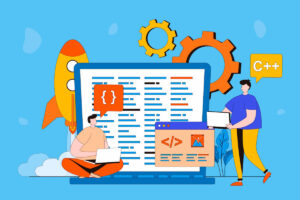In the digital age, the speed of your website can be the deciding factor between success and failure. With users’ attention spans dwindling, ensuring quick load times is crucial. PHP, a server-side scripting language, powers a significant portion of the web. Its role in web development is undeniable, influencing everything from your website’s functionality to its speed. Thus, PHP performance optimization becomes a pivotal concern for developers aiming to boost website speed and enhance user experience. In this guide, we will explore various techniques and best practices for improving PHP application performance.
I. Understanding PHP Performance
The performance of PHP, as with any server-side scripting language, is influenced by many factors including choice of PHP version, code quality, server configuration, and database interaction efficiency. PHP’s direct impact on website loading times stems from how quickly the server executes PHP scripts to render web pages. Faster script execution leads to shorter loading times, which is paramount in keeping users engaged and reducing bounce rates.
II. PHP Version Updates
Staying abreast of the latest PHP versions is critical for developers who prioritize performance. With each new release, PHP brings performance enhancements, security improvements, and new features that can significantly reduce script execution time. For instance, upgrading from PHP 7.0 to PHP 8.0 can result in a considerable performance boost, with benchmarks showing that PHP 8.0 can execute scripts faster than its predecessor. This dramatic improvement is due in part to the introduction of the Just-In-Time (JIT) compilation feature in PHP 8.0, which optimizes script execution by compiling parts of the code during runtime. By updating to the latest PHP version, developers can leverage these enhancements to improve website speed and overall performance.
III. Profiling PHP Applications
Efficient PHP performance optimization begins with properly profiling applications to identify bottlenecks. Profiling tools are instrumental in this process, providing developers with detailed insights into how PHP code executes, which helps in pinpointing the sections of code that cause delays. These tools can measure the time and resources consumed by different parts of an application, making it easier to focus optimization efforts where they are needed most.
To get started, developers can use tools like Xdebug or Blackfire. These profiling tools offer comprehensive data on script execution, memory usage, and database queries, among other metrics. By analyzing this data, developers can make informed decisions on areas for improvement, thereby enhancing application performance effectively.
IV. Effective Use of PHP Extensions
PHP extensions play a crucial role in enhancing the performance of PHP applications. These modules extend PHP’s capabilities, enabling it to perform tasks more efficiently. Key PHP extensions for performance improvement include OPcache, which optimizes PHP performance by storing precompiled script bytecode in shared memory, thus reducing the need for PHP to load and parse scripts on each request.
When selecting PHP extensions, it’s important to evaluate the specific needs of your application. For example, if your application handles large amounts of data, extensions like Memcached or Redis can significantly speed up data retrieval by caching data in memory.
V. Optimize Database Interactions
Optimizing database interactions is another critical aspect of PHP performance optimization. Efficient database queries can greatly reduce the time needed for data retrieval and manipulation, thereby speeding up application performance. Developers should ensure that they use indexes effectively, avoid unnecessary data retrieval, and limit the use of JOINs where possible to boost performance.
Additionally, integrating PHP development in India with powerful database management tools can further improve performance. Techniques such as database connection pooling, query caching, and using prepared statements can all contribute to more efficient database interactions, enhancing the speed and responsiveness of PHP applications.
VI. Caching Techniques
Caching is an indispensable tool in the optimization arsenal, especially for dynamic PHP applications. Implementing different caching strategies, like OpCode caching, data caching, and full-page caching, can help reduce the load on your server and make your pages load faster for repeat visitors. Caching also allows for better scalability, as it decreases the number of requests processed by the server.
Furthermore, using tailored caching solutions like Varnish or NGINX can provide even greater performance benefits by offloading some tasks from PHP to a dedicated caching layer. This can greatly improve response times and decrease server load, leading to faster application performance.
VII. Code Optimization
Writing efficient PHP code is a fundamental aspect of achieving optimal PHP performance. By adhering to a set of best practices, developers can write code that not only runs faster but is also more maintainable and scalable. Some key tips and techniques for PHP code optimization include:
- Utilize PHP’s Native Functions: Whenever possible, use PHP’s built-in functions. These functions are optimized for performance and can significantly reduce execution time compared to custom code for the same functionality.
- Minimize Use of Loops: Loops can be resource-intensive, especially with large datasets. Optimizing loops, or avoiding them when possible, using built-in array functions, can improve performance.
- Avoid Deep Nesting: Deeply nested code can be harder to read and debug. It can also lead to performance issues. Keeping your code structure simple and avoiding unnecessary complexity is key to maintaining good performance.
- Use String Functions Wisely: String manipulation can be costly in terms of performance. Using functions like
strpos()instead of regex for simple checks can yield faster execution times. - Leverage Memory Management Techniques: Be conscious of memory usage. Unsetting variables that are no longer needed and using memory-efficient data structures can help in keeping the memory footprint low.
VIII. Leveraging Content Delivery Networks (CDNs)
CDNs can dramatically improve the performance of PHP applications by distributing the load across multiple servers worldwide. This not only speeds up the delivery of content to users based on their geographic location but also reduces the strain on your primary server, contributing further to an enhanced user experience. CDN providers also often offer caching services, which can reduce the need for repeated processing of dynamic content.
Conclusion
Boosting your website’s speed through PHP performance optimization is a continuous process, requiring attention to detail and a thorough understanding of your application’s workings. By following the tips and strategies outlined in this guide—from staying updated with PHP versions to leveraging CDNs—you can significantly enhance your site’s performance, improve user satisfaction, and ultimately, drive more success to your online endeavors. Encourage your development team to implement these PHP optimization techniques today and watch your website’s performance soar to new heights. Contact us today to learn more about how we can help optimize your PHP applications for optimal speed and efficiency.












I went through your article which was on optimization of PHP website. Here, I would like to add some easy points in your blog which are as follows.
1.Enable Caching
2.Optimize Database Queries
3.Compress and Minify Files
4.Optimize Images
5.Implement Lazy Loading
Hope this points migh help you. Readers, If you want to develop your PHP website, you can visit an IT company like Alakmalak . They have an experienced team in this field.